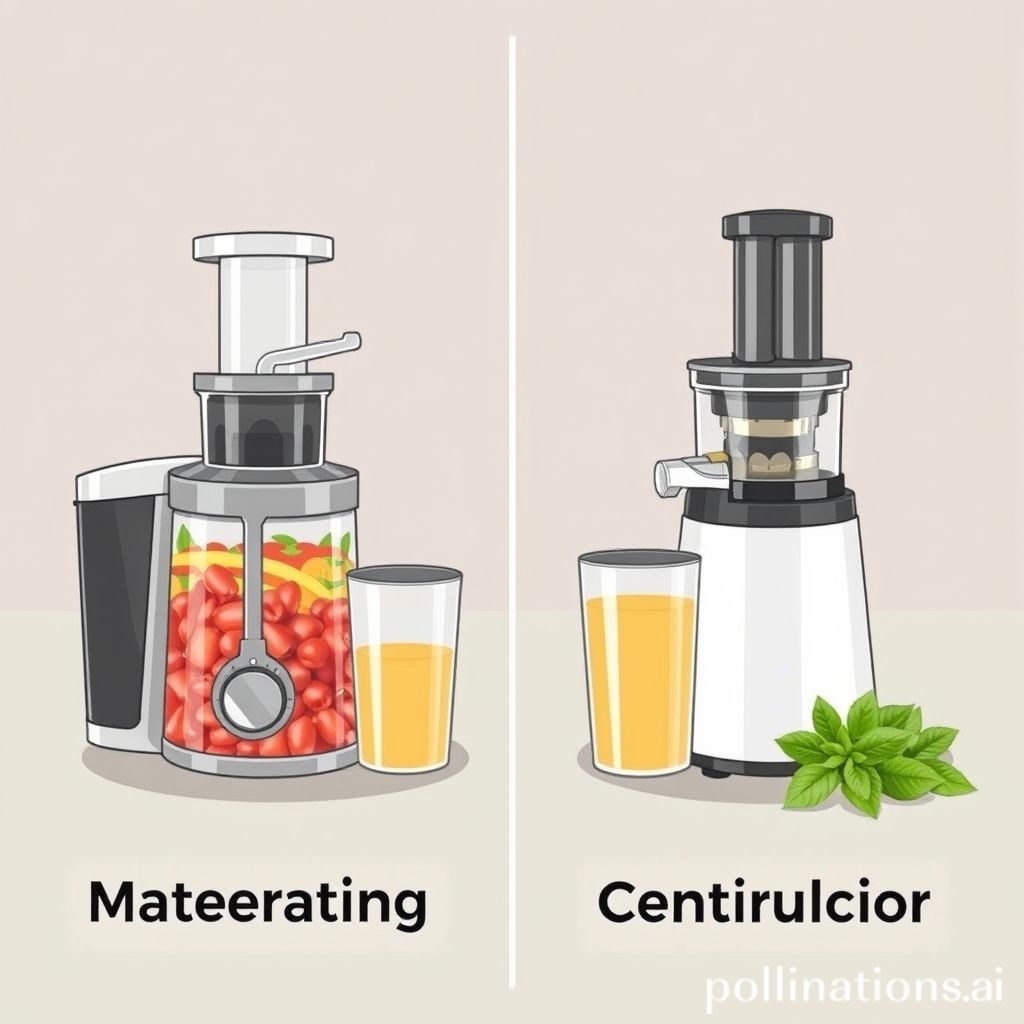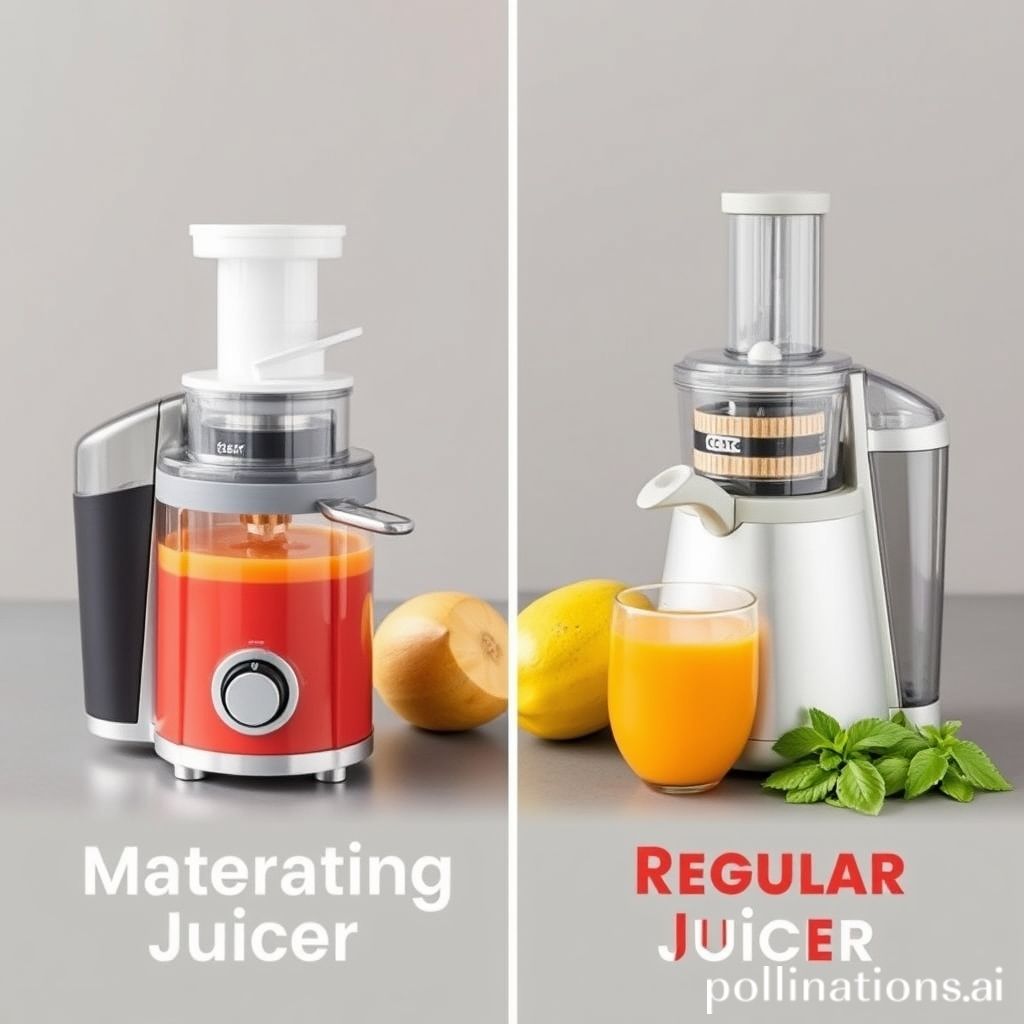What Is The Difference Between A Masticating Juicer And A Regular Juicer?
Watch out, kitchen enthusiasts! You may think all juicers are created equal, but think again. There is a hidden secret to unlocking the true potential of your favorite fruits and vegetables.
Enter the world of masticating juicers versus regular juicers. These two juicing powerhouses may seem similar at first glance, but they couldn’t be more different. With their unique designs and methods, they each bring their own set of benefits to the juicing game. So, before you make your next juicer purchase, let’s dive into the juicy details and compare the masticating juicer and the regular juicer. Get ready to discover which one truly reigns supreme in the world of juicing.

Table of Contents
What is a masticating juicer?
1. How it works
A masticating juicer, also known as a slow juicer or cold press juicer, operates using a slow and gentle process to extract juice from fruits and vegetables. Unlike regular juicers, which utilize high-speed spinning blades to extract juice, masticating juicers utilize a single gear or auger that slowly crushes the produce against a stainless-steel mesh screen. This process effectively breaks down the cell walls of the produce, resulting in a higher yield of juice.
With its slow and meticulous extraction process, a masticating juicer minimizes heat buildup and oxidation, which can degrade the nutritional quality and taste of the juice. The slow speed also reduces the amount of foam and froth in the juice, resulting in a smoother texture and better flavor.
Additionally, the slow extraction process of masticating juicers preserves more nutrients, vitamins, and enzymes in the juice, making it a healthier choice for those seeking maximum nutritional benefits. The gentle crushing action also prevents excess air from being incorporated into the juice, minimizing oxidation and extending the shelf life of the juice.
2. Benefits of using a masticating juicer
Using a masticating juicer offers several advantages over regular juicers:
- Higher juice yield: The slow and thorough extraction process of a masticating juicer ensures that more juice is extracted from the produce, resulting in a higher yield.
- Better juice quality: The minimal heat buildup and oxidation in a masticating juicer help preserve the nutrients, vitamins, and enzymes in the juice, providing a higher quality of juice with enhanced flavor and nutritional benefits.
- Versatility: Masticating juicers are not limited to juicing fruits and vegetables. They can also handle leafy greens, wheatgrass, and even make nut milk and baby food.
- Quiet operation: Compared to regular juicers, masticating juicers operate at a lower speed, resulting in a quieter juicing experience.
- Longer shelf life: Due to the minimal oxidation, juices made with a masticating juicer have a longer shelf life and can be stored for up to 72 hours without significant degradation in quality.
In the course of masticating juicers may have a slower juicing process and higher price tag compared to regular juicers, their numerous benefits make them a preferred choice for health-conscious individuals seeking high-quality, nutrient-rich juice.
Expert Tips: Maximize your juicing experience with a masticating juicer. Enjoy higher yield, better quality, versatility, quiet operation, and longer shelf life.What is a regular juicer (centrifugal juicer)?
A regular juicer, also called a centrifugal juicer, is a popular type of juicer commonly found in households. It works by using a fast-spinning blade to grind fruits and vegetables into pulp, and then uses centrifugal force to separate the juice from the pulp. This type of juicer is widely available and generally more affordable compared to other types of juicers.
1. How does it work?
A regular juicer operates by cutting the fruits or vegetables into small pieces and feeding them into a chute. The fast-spinning blade inside the juicer shreds the produce, extracting the juice. A mesh filter or strainer is used to separate the pulp from the juice. The juice flows into a container for consumption, Meanwhile the pulp is collected in a separate container for disposal.
2. Benefits of using a regular juicer
- Efficiency: Regular juicers are known for their high-speed operation, allowing for quick and efficient juicing. This is especially beneficial when you need to prepare juice in a short amount of time.
- Convenience: With its simple design and easy-to-use features, a regular juicer offers convenience for everyday juicing. It requires minimal preparation and is relatively easy to clean.
- Wide range of ingredients: Regular juicers can handle a wide variety of fruits and vegetables, including hard and soft produce. This versatility allows you to experiment with different flavors and combinations.
- Affordability: Compared to other types of juicers, regular juicers are often more affordable, making them a popular choice for those who are new to juicing or have a limited budget.
Table: Comparison of Masticating Juicer and Regular Juicer
| Masticating Juicer | Regular Juicer (Centrifugal Juicer) |
|---|---|
| Operates at a slower speed | Operates at a high speed |
| Preserves more nutrients and enzymes | May generate more heat and oxidation, leading to some nutrient loss |
| Efficient at juicing leafy greens and wheatgrass | Efficient at juicing most fruits and vegetables |
| Produces less foam and oxidation | May produce more foam and oxidation |
Comparison of Masticating Juicer and Regular Juicer
1. Juice Quality
One of the main differences between a masticating juicer and a regular juicer is the quality of the juice they produce. Masticating juicers, also known as slow juicers or cold press juicers, use a slow and gentle squeezing action to extract juice from fruits and vegetables. This slow process reduces heat and oxidation, resulting in higher quality juice that contains more nutrients, enzymes, and antioxidants. Regular juicers, Conversely, use fast-spinning blades that generate heat and introduce more oxygen into the juice, which can lower its nutritional value.
2. Juice Yield
Masticating juicers are known for their high juice yield. The slow and thorough extraction process of these juicers ensures that more juice is extracted from the produce, leaving behind drier pulp. Regular juicers, especially centrifugal juicers, may not extract as much juice, and the pulp may still contain some moisture.
3. Nutrient Retention
Due to their slow and gentle extraction process, masticating juicers retain more nutrients in the juice. The minimal exposure to heat and oxygen helps to preserve vitamins, minerals, and enzymes that are susceptible to degradation. Regular juicers, especially those with high-speed spinning blades, may cause more nutrient loss due to heat and oxidation.
4. Noise Level
Masticating juicers operate quietly compared to regular juicers. The slow squeezing action of masticating juicers produces less noise, making them suitable for those who prefer a quieter juicing experience. Regular juicers, particularly centrifugal juicers, can be quite noisy due to their high-speed spinning blades.
5. Price
Masticating juicers tend to be more expensive than regular juicers. The advanced technology and slower extraction process of masticating juicers contribute to their higher price tag. Regular juicers, especially centrifugal juicers, are generally more affordable options.

Advantages and Disadvantages of Masticating Juicer
1. Advantages
Increased Nutritional Value: Masticating juicers operate at a slower speed, which helps retain more nutrients and enzymes in the juice.
Efficient Juice Extraction: Masticating juicers use a chewing or grinding action to extract juice, resulting in a higher juice yield compared to regular juicers.
Versatility: Masticating juicers often come with additional features, allowing you to make nut butter, pasta, sorbets, and baby food.
Less Foam and Pulp: The slow squeezing action of masticating juicers produces juice with less foam and pulp, providing a smoother drinking experience.
2. Disadvantages
Higher Cost: Masticating juicers are generally more expensive due to their advanced technology and additional features.
Slower Juicing Process: Masticating juicers take more time to extract juice compared to regular juicers.
Narrow Feed Chute: Masticating juicers typically have a smaller feed chute, requiring you to cut fruits and vegetables into smaller pieces before juicing.
Heavier and Bulkier: Masticating juicers are often larger and heavier, which may be a consideration if you have limited counter space or plan to move the juicer frequently.
Advantages and Disadvantages of Regular Juicers
1. Advantages
A regular juicer, also called a centrifugal juicer, offers several benefits that make it popular among consumers:
- Efficiency: Regular juicers are designed to extract juice quickly, saving time for busy individuals.
- Convenience: These juicers usually have larger feeding chutes, allowing you to process whole fruits and vegetables without much preparation.
- Affordability: Compared to masticating juicers, regular juicers are often more budget-friendly, making them suitable for those on a tight budget.
2. Disadvantages
Despite their advantages, regular juicers also have some drawbacks that you should be aware of:
- Oxidation: The high-speed spinning of the blades in regular juicers can introduce more air into the juice, leading to oxidation and a shorter shelf life.
- Nutrient Loss: The fast juicing process generates heat, which can degrade the nutritional value of the juice, resulting in reduced enzyme activity and lower vitamin content.
- Less Juice Yield: Regular juicers are less efficient in extracting juice compared to masticating juicers, meaning you may get less juice from the same amount of produce.
Considering these advantages and disadvantages, it is important to evaluate your priorities and requirements before deciding on a regular juicer. If you prioritize speed, convenience, and affordability, a regular juicer may be the right choice for you. That being said, if you value maximum nutrient retention and juice yield, a masticating juicer might be a better option.
Conclusion
When comparing a masticating juicer and a regular juicer, it is clear that the masticating juicer offers several advantages. It operates at a slower speed, preserving more nutrients and enzymes in the juice.
The masticating juicer also produces a higher yield and can handle a wider variety of ingredients. Meanwhile regular juicers are faster and more affordable, they tend to generate more heat and oxidation, resulting in a lower juice quality. Ultimately, the choice between the two depends on individual preferences and needs. That being said, for those seeking maximum nutrition and versatility, the masticating juicer is the better option.
Faq about the Difference Between a Masticating Juicer and a Regular Juicer
FAQ 1: What is the main difference between a masticating juicer and a regular juicer?
A masticating juicer, also known as a slow juicer, uses a slow and gentle squeezing action to extract juice from fruits and vegetables. Contrarily, a regular juicer, also known as a centrifugal juicer, uses high-speed spinning blades to separate juice from the pulp.
FAQ 2: Which juicer produces higher quality juice?
A masticating juicer produces higher quality juice compared to a regular juicer. The slow squeezing action of a masticating juicer helps to preserve the nutrients, enzymes, and flavors in the juice, resulting in a richer and more vibrant taste.
FAQ 3: Which juicer extracts more juice?
A masticating juicer extracts more juice compared to a regular juicer. The slow and efficient squeezing action of a masticating juicer ensures that maximum juice is extracted from the fruits and vegetables, leaving behind drier pulp.
FAQ 4: Does a masticating juicer retain more nutrients?
Yes, a masticating juicer retains more nutrients compared to a regular juicer. The slow and gentle extraction process of a masticating juicer minimizes heat and oxidation, which helps to preserve the vitamins, minerals, and enzymes present in the juice.
FAQ 5: Is a masticating juicer more expensive than a regular juicer?
Yes, a masticating juicer is generally more expensive than a regular juicer. The advanced technology and slower extraction process of a masticating juicer contribute to its higher price point. Nevertheless, considering the higher quality and nutrient retention, many people find it worth the investment.
Read Similar Post:
1. Boost Your Business with a Commercial Juicer: A Complete Guide to Features, Benefits, and Types
2. Transforming Your Mixer Grinder: A Surprising Juice-making Solution
